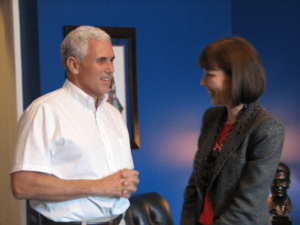Judith Miller facts for kids
Quick facts for kids
Judith Miller
|
|
|---|---|

Miller in 2018
|
|
| Born | January 2, 1948 New York City, U.S.
|
| Education | Columbia University (BA) Princeton University (MPA) |
| Spouse(s) |
Jason Epstein
(m. 1993; died 2022) |
| Relatives | Bill Miller (father) Jimmy Miller (half-brother) |
Judith Miller (born January 2, 1948) is an American journalist and writer. She is known for her reporting on Iraq's weapons programs before and after the 2003 invasion. Some of her reports were later found to be based on information that was not correct. She worked for The New York Times newspaper and later joined Fox News.
Miller co-wrote a book called Germs: Biological Weapons and America's Secret War. This book became a best-seller. She also received a fake anthrax letter during the 2001 anthrax attacks.
The New York Times later found that some of her stories about Iraq were not accurate. She left the newspaper in 2005. Miller has said that her job was to report what the government believed about Iraq's weapons, not to check if the government's information was correct herself. In 2015, she wrote a book about her experiences called The Story: A Reporter's Journey.
Miller was also involved in a situation called the Plame Affair. This happened when the identity of a Central Intelligence Agency (CIA) spy, Valerie Plame, was shared with reporters. Miller spent 85 days in jail because she would not tell who her source was in this case. Her source was later revealed to be Scooter Libby, who worked for Vice President Dick Cheney. After leaving The New York Times, Miller worked for conservative news channels like Fox News Channel and Newsmax.
Contents
Early Life and Education
Judith Miller was born in New York City. Her father, Bill Miller, was a successful businessman. He owned a nightclub and later operated casinos in Las Vegas. He was known for booking famous performers like Elvis Presley. Her mother was an Irish Catholic showgirl.
Miller went to Ohio State University and then graduated from Barnard College at Columbia University in 1969. She also earned a master's degree from Princeton University's School of Public and International Affairs. In 1993, she married Jason Epstein, who was an editor and publisher.
Judith Miller's half-brother is Jimmy Miller. He was a record producer for many famous rock bands, including The Rolling Stones.
Journalism Career

While working at The New York Times, Judith Miller was part of a team that won the Pulitzer Prize for Explanatory Reporting. They won this award for their reporting on global terrorism around the time of the September 11 attacks in 2001.
Some people criticized Miller's writing during this time. A scholar named Edward Said said that her book God Has Ninety-Nine Names showed a negative view of Islam. He also said she did not understand Arabic well.
Anthrax Hoax Incident
On October 12, 2001, Judith Miller received a fake anthrax letter at her New York Times office. This happened during the 2001 anthrax attacks, when real anthrax-laced letters were sent to other news organizations and politicians.
Miller was one of the few major U.S. reporters to receive a fake anthrax letter. She had written a lot about biological threats. She had also co-written a book about bio-terrorism called Germs: Biological Weapons and America's Secret War, which was published shortly before the attacks.
Reporting on the Iraq War
At The New York Times, Miller wrote many stories about security and Iraq's weapons programs. Many of these stories later turned out to be based on information that was not correct.
For example, in September 2002, Miller and her colleague Michael R. Gordon reported about "aluminum tubes" going to Iraq. Their story quoted unnamed officials who said these tubes were for making nuclear weapons. Other government officials, like Condoleezza Rice and Colin Powell, used Miller's story to support their arguments for war.
Miller later said that her job was to report what the government believed about Iraq's weapons, not to check if the government's information was correct herself.
In April 2003, Miller reported that an Iraqi scientist claimed Iraq had kept biological and chemical weapons until "right before the invasion." This report was widely covered. However, there were questions about this information, and it was later found to be incorrect.
In 2004, The New York Times admitted that some of its reporting before the war had relied too much on sources who wanted a change in Iraq's government. The newspaper said it regretted that "controversial information [was] allowed to stand unchallenged."
In 2005, Miller faced legal action for not revealing a source in the Plame affair criminal investigation. She spent 85 days in jail in Alexandria, Virginia. After her release, The New York Times' Public Editor wrote that many of her articles about Iraq's weapons had been inaccurate. Two weeks later, Miller left The New York Times.
Refusal to Disclose a Source
In July 2005, Judith Miller was jailed for refusing to testify before a federal grand jury. This jury was investigating who had leaked the information that Valerie Plame was a CIA officer. Miller had not written an article about Plame, but she was believed to have important information for the investigation.
Miller's lawyers argued that jailing her was pointless because she would never reveal her confidential sources. They suggested she could be confined to her home instead. After 85 days in jail, Miller was released on September 29, 2005. She agreed to tell the grand jury that her source was Lewis Libby, who was Vice President Cheney's chief of staff.
Miller testified as a witness in the trial of Lewis Libby in 2007. She discussed conversations she had with Libby in 2003. The trial ended with Libby being found guilty on some charges.
Later Career and Writing
After leaving The New York Times, Miller continued to write. She contributed articles to The Wall Street Journal. In 2007, she became a fellow at the Manhattan Institute for Policy Research, a research organization. In 2008, Fox News hired her.
As of 2018, she is a member of the Council on Foreign Relations. She also gives talks about the Middle East, Islam, terrorism, and national security topics.
Revisiting the Iraq War
In April 2015, Judith Miller wrote an article in The Wall Street Journal where she defended her reporting before the Iraq War. She said that government officials did not lie, and she was not tricked. Miller admitted that there were mistakes about Iraq, and she made some of them. She acknowledged that the claims in some of her pre-war stories about weapons of mass destruction were wrong. However, she disagreed with the idea that she was responsible for starting the war.
Critics responded by saying that her war reporting was very wrong. They said her attempt to rewrite history was not accurate. Some pointed out that she ignored information showing that the Bush administration was planning an invasion of Iraq even before the intelligence used to justify it.
Memoir
In April 2015, Miller published her book, The Story: A Reporter's Journey. This book mostly focused on her reporting during the Iraq War. Many reviews of the book were critical. Some called it an attempt to defend herself rather than a true memoir. Critics felt she did not fully take responsibility for the problems in her reporting.
See also
 In Spanish: Judith Miller para niños
In Spanish: Judith Miller para niños
- Reporters' privilege
- Journalistic scandal

